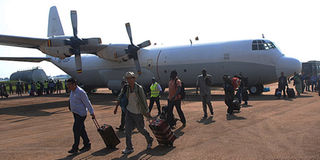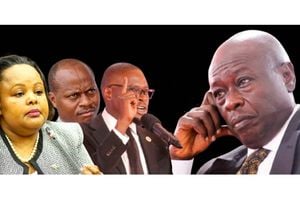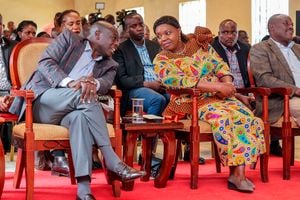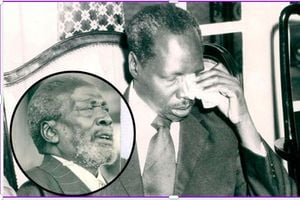Juba conflict bodes badly for East Africa

PHOTO | AFP Foreigners who were evacuated from S Sudan arrive at the Entebbe International Airport on December 20. Many East African firms and individuals who have invested in Juba are at risk of huge losses.
What you need to know:
- Refugee burden lingers as talks with North are hit
- Criss-crossed by River Nile, with its boundless potential resources, South Sudan is also overflowing with, as yet, practically unexploited oil resources that are hardly benefiting the population of Africa’s youngest nation.
As the escalating crisis in South Sudan rapidly assumes seismic proportions, neighbouring countries are rightly worried as they digest the wider implications of uncurtailed insecurity in the long-troubled nation.
Criss-crossed by River Nile, with its boundless potential resources, South Sudan is also overflowing with, as yet, practically unexploited oil resources that are hardly benefiting the population of Africa’s youngest nation.
Now embroiled in a rebellion that appears to have been well planned, the country seems set to roll back the paltry benefits it has enjoyed since its independence.
Regrettably, South Sudanese soldiers have had their cudgels out since last Sunday, fighting amongst themselves as fatalities ran into hundreds and civilians scuttled for cover.
In the meantime, foreign nationals affected by the fighting have been camping at the UN compound in the capital since Monday while awaiting evacuation to their home countries.
Most of the foreigners affected, including Kenyans, were based in Juba, the fallen Bor city and the politically cataclysmic Jonglei state.
In the past embroiled in ceaseless quarrels with its northern neighbour Sudan, the country has also for years suffered from the results of internal turmoil and internecine quarrels that seem to be a part of its political chemistry.
Already one of the least developed countries in the world, South Sudan has one of the highest number of refugees in Africa, and has never quite recovered from the decades of civil war that finally ended with its independence in 2011.
Now that clashes between rival factions of the Sudan People’s Liberation Army are finally boiling over, the country seems set for regression that it can hardly afford, with blood-thirsty soldiers loyal to President Salva Kiir and sacked Vice President Riek Machar going for each others’ throats.
The serious nature of the internal problems facing the country became clear when the problems that began in Juba rapidly spread and culminated in the capture of Bor, about 100 kilometres north of Juba, on 18 December by troops loyal to Dr Machar.
SCHISMS FUELLING CARNAGE
Unfortunately, the political schisms fuelling the current pogrom are already sucking in neighbouring countries having economic interests in the oil- rich young nation.
Crucial for the potential development of South Sudan, these countries are unlikely to pour in more investments in the unstable nation in the near future.
Already, foreign investors from neighbouring countries have been bussed out as the deteriorating situation left them cutting their losses. Among them were Kenyan and Ugandan nationals, some of who were injured as they fled the clashes.
That the instability in the country is a matter of international concern became abundantly clear when Ban Ki-moon, the UN Secretary General, called for a political dialogue on 18 December.
Also calling for peace talks was the African Union, whose delegation met President Kiir on December 19 to convince him to dialogue with his political opponents for the sake of avoiding a long-drawn crisis in the country. Led by Ethiopia’s Foreign Minister Tedros Adhanom, the AU delegation reportedly underscored the need for regional stability.
Bordered to the West by the chaotic Central African Republic, South Sudan also shares a boundary with the equally unstable Democratic Republic of Congo, which has for years been theatre of ceaseless wars, despite having natural resources that have hardly benefited its people.
Gracefully though, there was hope for resolution of the conflict when President Kiir said on Wednesday that he is willing to hold talks with Dr Machar, who has denied involvement in the current crisis, amid reports that security forces are hunting him down in a bid to arrest him.
Sadly, South Sudan’s current crisis has come just months after headway was made in September when it agreed with its northern neighbour to resume the crucial flow of South Sudan’s oil through Port Sudan on Red Sea.
Although a number of other issues are still pending between the two countries, there was light at the end of the tunnel, including prospects for the eventual resolution of the long-standing dispute over Abyei area.





